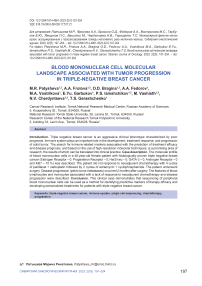Blood mononuclear cell molecular landscape associated with tumor progression in triple-negative breast cancer
Автор: Patysheva M.R., Frolova A.A., Bragina O.D., Fedorov A.A., Vostrikova M.A., Garbukov E.Yu., Iamshchikov P.S., Vashisth M., Cherdyntseva N.V., Gerashchenko T.S.
Журнал: Сибирский онкологический журнал @siboncoj
Рубрика: Случай из клинической практики
Статья в выпуске: 5 т.22, 2023 года.
Бесплатный доступ
Introduction. Triple negative breast cancer is an aggressive clinical phenotype characterized by poor prognosis. Immune system plays an important role in the development, treatment response, and progression of solid tumor. The search for immune-related markers associated with the prediction of treatment efficacy and disease prognosis, and based on the use of high-resolution molecular techniques, is a promising area of research, the results of which can be translated into clinical practice. Case description. The molecular profile of blood mononuclear cells in a 48-year-old female patient with histologically proven triple negative breast cancer (Estrogen Receptor - 0; Progesteron Receptor - 0; Her2/neu - 0; GATA-3 - 0, Androgen Receptor - 0 and Ki67 - 70 %) was described. The patient did not response to neoadjuvant chemotherapy with 4 cycles of paclitaxel + carboplatin followed by 2 cycles of adriamycin + cyclophosphamide. The patient underwent surgery. Disease progression (pelvic bone metastases) occurred 2 months after surgery. The features of blood lymphocytes and monocytes associated with a lack of response to neoadjuvant chemotherapy and disease progression were described.
Triple-negative breast cancer, immune system, single cell sequencing, chemotherapy, progression
Короткий адрес: https://sciup.org/140303540
IDR: 140303540 | DOI: 10.21294/1814-4861-2023-22-5-197-204
Список литературы Blood mononuclear cell molecular landscape associated with tumor progression in triple-negative breast cancer
- García-Teijido P., Cabal M.L., Fernández I.P., Pérez Y.F. Tumor- Infiltrating Lymphocytes in Triple Negative Breast Cancer: The Future of Immune Targeting. Clin Med Insights Oncol. 2016; 10(S1): 31–9. doi: 10.4137/CMO.S34540.
- Zarotti C., Papassotiropoulos B., Elfgen C., Dedes K., Vorburger D., Pestalozzi B., Trojan A., Varga Z. Biomarker dynamics and prognosis in breast cancer after neoadjuvant chemotherapy. Scientific reports. 2022; 12(1): 91. doi: 10.1038/s41598-021-04032-x.
- Loi S., Sirtaine N., Piette F., Salgado R., Viale G., Van Eenoo F., Rouas G., Francis P., Crown J.P., Hitre E., de Azambuja E., Quinaux E., Di Leo A., Michiels S., Piccart M.J., Sotiriou C. Prognostic and predictive value of tumor-infiltrating lymphocytes in a phase III randomized adjuvant breast cancer trial in node-positive breast cancer comparing the addition of docetaxel to doxorubicin with doxorubicin-based chemotherapy: BIG 02- 98. J Clin Oncol. 2013; 31(7): 860–7. doi: 10.1200/JCO.2011.41.0902.
- Lin G.N., Peng J.W., Liu D.Y., Xiao J.J., Chen Y.Q., Chen X.Q. Increased lymphocyte to monocyte ratio is associated with better prognosis in patients with newly diagnosed metastatic nasopharyngeal carcinoma receiving chemotherapy. Tumour Biol. 2014; 35(11): 10849–54. doi: 10.1007/s13277-014-2362-6.
- Peng Y., Chen R., Qu F., Ye Y., Fu Y., Tang Z., Wang Y., Zong B., Yu H., Luo F., Liu S. Low pretreatment lymphocyte/monocyte ratio is associated with the better efficacy of neoadjuvant chemotherapy in breast cancer patients. Cancer Biol Ther. 2020; 21(2): 189–96. doi: 10.1080/15384047.2019.1680057.
- Lu C., Zhou L., Ouyang J., Yang H. Prognostic value of lymphocyteto- monocyte ratio in ovarian cancer: A meta-analysis. Medicine (Baltimore). 2019; 98(24). doi: 10.1097/MD.0000000000015876.
- Geiger R., Duhen T., Lanzavecchia A., Sallusto F. Human naive and memory CD4+ T cell repertoires specific for naturally processed antigens analyzed using libraries of amplified T cells. J Exp Med. 2009; 206(7): 1525–34. doi: 10.1084/jem.20090504.
- Nausch N., Bourke C.D., Appleby L.J., Rujeni N., Lantz O., Trottein F., Midzi N., Mduluza T., Mutapi F. Proportions of CD4+ memory T cells are altered in individuals chronically infected with Schistosoma haematobium. Sci Rep. 2012; 2: 472. doi: 10.1038/srep00472.
- Duggleby R., Danby R.D., Madrigal J.A., Saudemont A. Clinical Grade Regulatory CD4+ T Cells (Tregs): Moving Toward Cellular-Based Immunomodulatory Therapies. Front Immunol. 2018; 9: 252. doi: 10.3389/fimmu.2018.00252.
- Hashimoto K., Kouno T., Ikawa T., Hayatsu N., Miyajima Y., Yabukami H., Terooatea T., Sasaki T., Suzuki T., Valentine M., Pascarella G., Okazaki Y., Suzuki H., Shin J.W., Minoda A., Taniuchi I., Okano H., Arai Y., Hirose N., Carninci P. Single-cell transcriptomics reveals expansion of cytotoxic CD4 T cells in supercentenarians. Proc Natl Acad Sci USA. 2019; 116(48): 24242–51. doi: 10.1073/pnas.1907883116.
- Pulko V., Davies J.S., Martinez C., Lanteri M.C., Busch M.P., Diamond M.S., Knox K., Bush E.C., Sims P.A., Sinari S., Billheimer D., Haddad E.K., Murray K.O., Wertheimer A.M., Nikolich-Žugich J. Human memory T cells with a naive phenotype accumulate with aging and respond to persistent viruses. Nat Immunol. 2016; 17(8): 966–75. doi: 10.1038/ni.3483.
- Kleiveland C.R. Peripheral Blood Mononuclear Cells. In: Verhoeckx K., Cotter P., López-Expósito I., Kleiveland C., Lea T., Mackie A., Requena T., Swiatecka D., Wichers H., editors. The Impact of Food Bioactives on Health: in vitro and ex vivo models [Internet]. Cham (CH): Springer; 2015. Chapter 15.
- Патышева М.Р., Стахеева М.Н., Ларионова И.В., Тарабановская Н.А., Григорьева Е.С., Слонимская Е.М., Кжышковска Ю.Г., Чердынцева Н.В. Моноциты при злокачественных новообразованиях: перспективы и точки приложения для диагностики и терапии. Бюллетень сибирской медицины. 2019; 18(1): 60–75. [Patysheva M.R., Stakheeva M.N., Larionova I.V., Tarabanovskaya N.A., Grigorieva E.S., Slonimskaya E.M., Kzhyshkowska J.G., Cherdyntseva N.V. Monocytes and cancer: promising role as a diagnostic marker and application in therapy. Bulletin of Siberian Medicine. 2019; 18(1): 60–75. (in Russian)]. doi: 10.20538/1682-0363-2019-1-76-83.
- Kohli K., Pillarisetty V.G., Kim T.S. Key chemokines direct migration of immune cells in solid tumors. Cancer Gene Ther. 2022; 29(1): 10–21. doi: 10.1038/s41417-021-00303-x.
- Aldinucci D., Borghese C., Casagrande N. The CCL5/CCR5 Axis in Cancer Progression. Cancers (Basel). 2020; 12(7): 1765. doi: 10.3390/cancers12071765.
- Das P., Pal S., Oldfield C.M., Thillai K., Bala S., Carnevale K.A., Cathcart M.K., Bhattacharjee A. A PKCβ-LYN-PYK2 Signaling Axis Is Critical for MCP-1-Dependent Migration and Adhesion of Monocytes. J Immunol. 2021; 206(1): 181–92. doi: 10.4049/jimmunol.1900706.
- Larionova I., Kazakova E., Gerashchenko T., Kzhyshkowska J. New Angiogenic Regulators Produced by TAMs: Perspective for Targeting Tumor Angiogenesis. Cancers (Basel). 2021; 13(13): 3253. doi: 10.3390/cancers13133253.


